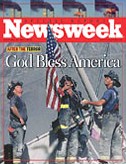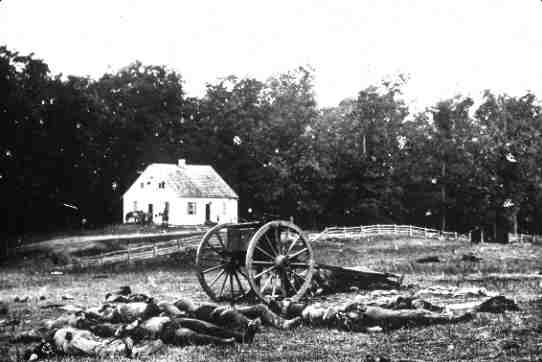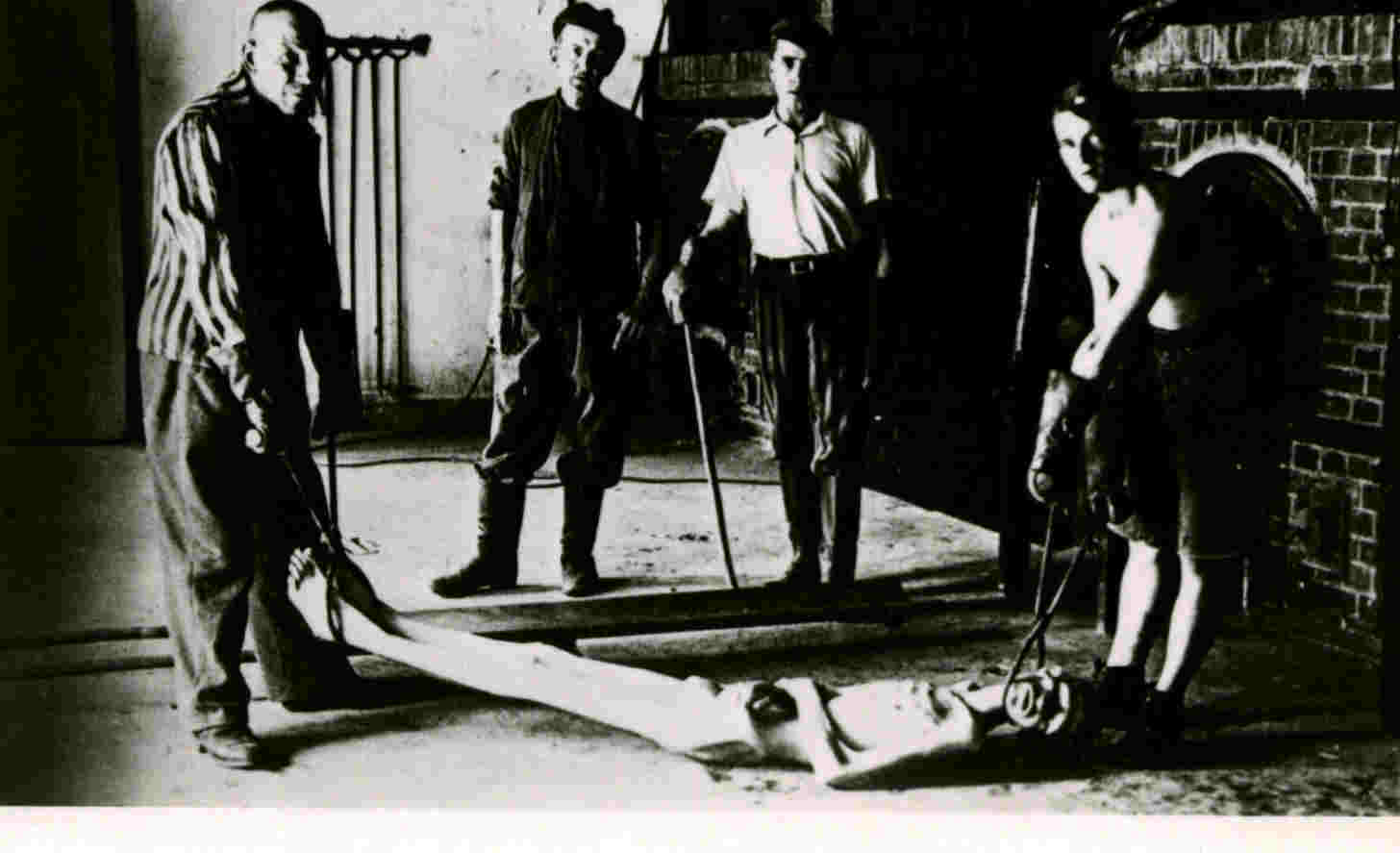"When utmost
evil..."
Message preached September 23,
2001
Long Green Valley Church of the Brethren
Glen Arm, Maryland USA
based upon 1
Peter 4:12-19
Order
of Worship
I never thought Iíd say this, but it was a blessing to see commercials back
on television after their absence from network  coverage
of the recent terrorist attacks. It meant that life was returning to some
semblance of "normal." Of course, our world drastically changed on
September 11th, even if we werenít personally connected to any of
the victims... My Newsweek magazine arrived on its usual day this past
week, the whole issue devoted to what happened. Unlike other weeks, however, Iím
still making my way through it. I find I can only read so much, and then I have
to put it down. Iím still trying to make sense of it all.
coverage
of the recent terrorist attacks. It meant that life was returning to some
semblance of "normal." Of course, our world drastically changed on
September 11th, even if we werenít personally connected to any of
the victims... My Newsweek magazine arrived on its usual day this past
week, the whole issue devoted to what happened. Unlike other weeks, however, Iím
still making my way through it. I find I can only read so much, and then I have
to put it down. Iím still trying to make sense of it all.
[Listen to an NPR "Front
Porch" interview with friend and former
Long Green Valley-er, Russ Keat, who spent 3 days at ground zero.]
This "fiery ordeal" struck too close to home, with a fury which
went beyond imagination. Even the  bloodiest
day in the Civil War at Antietam
battlefield had fewer casualties. So did D-day during World War II, or so Iíve
been told. What made the evil of September 11th so insidious was that
it was so mundane. Civilian jetliners were used, not missiles or bombs made
especially for the purpose of death. And those who committed the acts were
someoneís neighbors, men who were unassuming and polite, weíve been told,
even though a bit distant. When returning a rental car before that fateful day,
one even reminded the dealer that the vehicle needed servicing.
bloodiest
day in the Civil War at Antietam
battlefield had fewer casualties. So did D-day during World War II, or so Iíve
been told. What made the evil of September 11th so insidious was that
it was so mundane. Civilian jetliners were used, not missiles or bombs made
especially for the purpose of death. And those who committed the acts were
someoneís neighbors, men who were unassuming and polite, weíve been told,
even though a bit distant. When returning a rental car before that fateful day,
one even reminded the dealer that the vehicle needed servicing.
Reminds me of a story my father told. He was in the Army in World War II, and
had helped liberate Dachau,
an infamous concentration camp where Jews were exterminated. His job was
resettling the prisoners who survived. Among the horrifying  memories he brought
back was of a sign in the crematorium, where they burned the bodies.
"Cleanliness is next to godliness," it read in German. A proverb
perverted! Perhaps the most terrifying aspect of this evil was that it was so
mundane. These were ordinary citizens just doing their job, someoneís
neighbor.
memories he brought
back was of a sign in the crematorium, where they burned the bodies.
"Cleanliness is next to godliness," it read in German. A proverb
perverted! Perhaps the most terrifying aspect of this evil was that it was so
mundane. These were ordinary citizens just doing their job, someoneís
neighbor.
Our President wisely pointed out that this "war against terrorism"
he proclaimed was not against Arabs in general, or the Moslem religion. This
terrorism, he said, is a perversion of Islam and their holy book, the Koran.
Just like Nazism was a perversion of Christianity and our holy book, the Bible.
In our response to this present perversion, we need to be careful that we donít
pervert the teachings of our Lord and Savior. Itís understandable how extreme
emotions have led some to strike back at Arabs in our own country. This minority
group is an easy target. They are our neighbors. Many dress distinctively, but
then, so do the Amish. So did the Brethren.
Speaking of our own distinctiveness, as Brethren we need to figure our way
through this current mess. We have a long tradition of emphasizing peace,
of refraining from violence, of conscientiously
objecting to military service, choosing other routes of serving that keep us
from violating what Jesus taught us. This will get tested in the days ahead, my
friends. I find, personally, that it is first tested within, as I deal
with my own anger over what happened on September 11th, as I read the
personal stories of those who were killed. As much as anyone, a part of me is
crying out, "vengeance!" I was so glad that our  President,
in what was perhaps the most significant speech a President has made in the last
fifty years, emphasized that we are not after vengeance, but justice.
President,
in what was perhaps the most significant speech a President has made in the last
fifty years, emphasized that we are not after vengeance, but justice.
I pray that this crisis will bring out the best in people, especially our
leaders. On television we witnessed the mayor of New York transformed from a
louse many people loved to hate into the leader he needed to be at that moment.
And a President who came into office amid controversy, with fears that he was
not up to the task, is proving otherwise. On the forge of "fiery
ordeals," true character is tested and shaped. May that be true of us as we
discern our path through these days, loving our country and supporting the quest
for justice, even as we seek to keep true to what Jesus taught us. Our
youth need to hear our peace witness now more than ever, even from the lips
of those who struggle with it. How else can they then choose the path they will
undertake as adults, and perhaps their own "fiery ordeal" that lies
ahead?...
Let me now return to something that has been central to our worship on this
day. In difficult times, music takes on new meaning. Did you hear that in
Buckingham Palace, the Queen of England had the band strike up "The Star
Spangled Banner" last week, a song about the British invasion of Baltimore
in 1812? This show of support, tinged with intended irony, spoke more than words
ever could.
However, Iím not so much referring to secular or patriotic music, as I am
to what Godís people do when times get rough. We sing! When we find ourselves
lost for a word to speak, we sing! Even when music is the last thing we think we
are capable of producing, still we sing! Our "hymns, songs, and
spiritual songs" (Colossians
3:16) lift up our praise as well as our lamentation. We sing them not
so much with the brain, as with the heart. However, "singing and making
melody to the Lord in your hearts" (Ephesians
5:19) is not just reserved for those moments when everything fits
together, when the sun shines and weíre happy. No, in singing out our faith in
times that are dark, we discover new strength we never thought we possessed.
This is a gift from God, hammered out on the forge of the "fiery
ordeal" through the Holy Spirit.
 In
singing out the faith, Godís people have survived and even thrived through
some very difficult periods. One of my favorite stories is of Martin
Rinkhart, who served as pastor in a German city where, at one point during
the Thirty Years War, he conducted more than 4,000 funerals in 1637, sometimes
forty or fifty a day, one being his own wife. In the middle of that "fiery
ordeal" he wrote the now famous hymn,
"Now thank We All Our God."
Irony? I donít believe so. When the going gets rough, Godís
people sing out their faith! Why? As the final book in the Bible reveals, when
Godís people sing, they do not sing alone. Saints triumphant and angels are
singing with us (Revelation
4:8-11, 5:8-14,
6:9-12,
11:15-18,
14:1-3,
15:1-4,
19:1-8).
In
singing out the faith, Godís people have survived and even thrived through
some very difficult periods. One of my favorite stories is of Martin
Rinkhart, who served as pastor in a German city where, at one point during
the Thirty Years War, he conducted more than 4,000 funerals in 1637, sometimes
forty or fifty a day, one being his own wife. In the middle of that "fiery
ordeal" he wrote the now famous hymn,
"Now thank We All Our God."
Irony? I donít believe so. When the going gets rough, Godís
people sing out their faith! Why? As the final book in the Bible reveals, when
Godís people sing, they do not sing alone. Saints triumphant and angels are
singing with us (Revelation
4:8-11, 5:8-14,
6:9-12,
11:15-18,
14:1-3,
15:1-4,
19:1-8).
Our last hymn today is one of my favorites. To me, it lays out what music in
worship is all about. "In liturgy and song, in faith and love through
centuries of wrong," it declares, the church has "borne witness to the
truth in every tongue." The fourth verse is especially poignant, for it
reveals that Christians do so because we are simply following the example of our
Lord. "And did not Jesus sing a psalm that night (Matthew
27:45-50, Mark
15:33-37, Psalm
22) when utmost evil strove against the Light? Then let
us sing for whom he won the fight. Alleluia!"
Well, Godís people - in the face of the "fiery ordeal" of events
recently past or yet to come - are we going to be silent, or are we going to
sing?
"When in our music
God is glorified" #44
©2001 Peter
L. Haynes
return to "Messages"
page
return to Long Green Valley Church
page
 coverage
of the recent terrorist attacks. It meant that life was returning to some
semblance of "normal." Of course, our world drastically changed on
September 11th, even if we werenít personally connected to any of
the victims... My Newsweek magazine arrived on its usual day this past
week, the whole issue devoted to what happened. Unlike other weeks, however, Iím
still making my way through it. I find I can only read so much, and then I have
to put it down. Iím still trying to make sense of it all.
coverage
of the recent terrorist attacks. It meant that life was returning to some
semblance of "normal." Of course, our world drastically changed on
September 11th, even if we werenít personally connected to any of
the victims... My Newsweek magazine arrived on its usual day this past
week, the whole issue devoted to what happened. Unlike other weeks, however, Iím
still making my way through it. I find I can only read so much, and then I have
to put it down. Iím still trying to make sense of it all. bloodiest
day in the Civil War at
bloodiest
day in the Civil War at  memories he brought
back was of a sign in the crematorium, where they burned the bodies.
"Cleanliness is next to godliness," it read in German. A proverb
perverted! Perhaps the most terrifying aspect of this evil was that it was so
mundane. These were ordinary citizens just doing their job, someoneís
neighbor.
memories he brought
back was of a sign in the crematorium, where they burned the bodies.
"Cleanliness is next to godliness," it read in German. A proverb
perverted! Perhaps the most terrifying aspect of this evil was that it was so
mundane. These were ordinary citizens just doing their job, someoneís
neighbor. President,
in what was perhaps the most significant speech a President has made in the last
fifty years, emphasized that we are not after vengeance, but justice.
President,
in what was perhaps the most significant speech a President has made in the last
fifty years, emphasized that we are not after vengeance, but justice. In
singing out the faith, Godís people have survived and even thrived through
some very difficult periods. One of my favorite stories is of
In
singing out the faith, Godís people have survived and even thrived through
some very difficult periods. One of my favorite stories is of